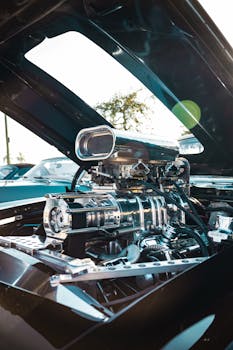
In a world of electric vehicles and hybrid SUVs, the Ford Mustang stands as a defiant symbol of American muscle. It's a legacy built on power, performance, and a rebellious spirit, but is it truly the last of its kind?
The Mustang: The Last Great American Muscle Car?
Where most muscle cars have disappeared, the Mustang marches on. It’s a nameplate synonymous with freedom, raw power, and the open road. But in an automotive landscape increasingly dominated by efficiency and electrification, can the Mustang maintain its iconic status? Is it, in fact, the last great American muscle car left standing?
A Legacy of Power and Rebellion
The Ford Mustang wasn't just a car; it was a cultural phenomenon. Launched in 1964, it captured the spirit of a generation hungry for speed and style. Its long hood, fastback design, and powerful V8 engine became instant classics. The Mustang represented affordability, performance, and a uniquely American brand of cool. It was a car that could be customized, raced, and, most importantly, enjoyed.
The Muscle Car Era and Beyond
The Mustang was a key player in the golden age of muscle cars, battling it out with rivals like the Chevrolet Camaro, Dodge Challenger, and Plymouth Barracuda. These cars defined an era, but as fuel prices rose and emissions regulations tightened, many were discontinued. The Mustang, however, persevered, adapting to changing times while retaining its core identity.
A Timeless Design
Even through various redesigns and iterations, the Mustang has remained instantly recognizable. The long hood, short deck, and galloping horse emblem are enduring symbols of its heritage. Modern Mustangs incorporate retro styling cues, paying homage to the classics while embracing contemporary design elements.
The Modern Mustang: Evolution or Revolution?
The current generation Mustang is a far cry from its 1960s ancestor, yet it still embodies the same spirit. It offers a range of engines, from the fuel-efficient EcoBoost to the roaring Coyote V8, catering to a wider audience than ever before. But does this evolution compromise its muscle car credentials?
Performance and Technology
The latest Mustang boasts impressive performance figures, with the GT model offering over 450 horsepower. Modern technology, such as independent rear suspension and advanced driver-assistance systems, enhances handling and safety. These advancements make the Mustang a capable and enjoyable car to drive, both on the street and on the track.
Embracing Electrification?
Ford has taken a bold step by introducing the Mustang Mach-E, an all-electric SUV bearing the Mustang name. While controversial among purists, the Mach-E demonstrates Ford's commitment to electrification while leveraging the Mustang's brand recognition. It also opens the door for future electric Mustang models that could potentially offer even greater performance than their gasoline-powered counterparts.
Example: Consider the Mustang Mach-E GT Performance Edition. It delivers instant torque and impressive acceleration, showcasing the potential of electric powertrains in a performance vehicle. This could be a glimpse into the future of the Mustang.
The Competition: Who Still Plays the Muscle Car Game?
While the Mustang remains a dominant force, it's not entirely alone in the muscle car arena. The Dodge Challenger and Chevrolet Camaro still offer powerful V8 options, but their futures are uncertain. With Dodge shifting its focus to electric vehicles and the Camaro recently discontinued (again), the Mustang's position as the last true muscle car becomes even more pronounced.
Challenger and Camaro: The Fallen Comrades
The Dodge Challenger, with its retro-inspired design and potent Hellcat variants, has been a strong competitor. The Chevrolet Camaro, known for its sharp handling and aggressive styling, also held its own. However, both models face an uncertain future, leaving the Mustang to carry the torch.
The Rise of Performance SUVs
While not traditional muscle cars, performance SUVs like the Jeep Grand Cherokee Trackhawk and the Porsche Cayenne Turbo offer similar levels of power and performance. These vehicles cater to a different market segment, but they represent a shift in consumer preferences towards practicality and versatility.
Tip: When comparing the Mustang to other performance vehicles, consider factors like price, performance, handling, and practicality. The Mustang offers a unique blend of these qualities that appeals to a wide range of drivers.
The Future of the Mustang: A Lasting Legacy?
The Mustang's future is likely to involve further electrification and technological advancements. Ford is committed to keeping the Mustang relevant in a changing automotive landscape, whether that means hybrid powertrains, fully electric models, or a combination of both. The key will be to maintain the Mustang's core identity while adapting to new technologies and consumer demands.
Preserving the Muscle Car Spirit
Even as the Mustang evolves, it's crucial to preserve the muscle car spirit that has defined it for generations. That means retaining the powerful engines, aggressive styling, and rebellious attitude that have made it such an iconic vehicle.
Tip: Ford can preserve the Mustang's legacy by offering performance-oriented models with powerful engines and engaging driving dynamics, even in an electric or hybrid future.
Conclusion
The Ford Mustang's resilience and adaptability have allowed it to outlast many of its rivals. While the automotive landscape continues to evolve, the Mustang remains a symbol of American muscle and performance. Whether it truly is the last great American muscle car is debatable, but its enduring legacy and continued presence on the road make a strong case for its claim to the title. It's a testament to the enduring appeal of power, style, and the open road.
